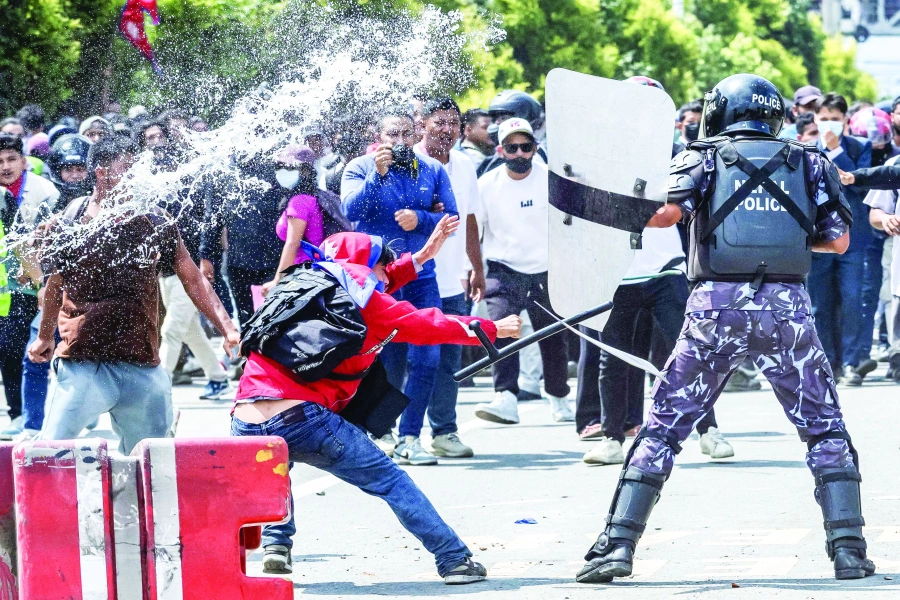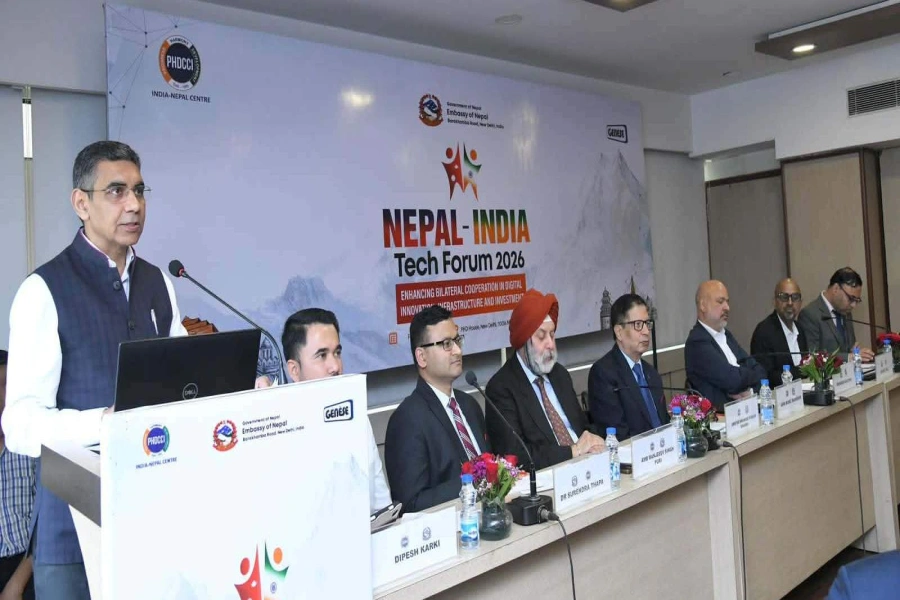Senior leader of Bharatiya Janata Party (BJP) Vijay Jolly is no stranger to Nepal. His extensive ties with Nepali political leaders of all persuasions frequently bring him to Nepal. He was recently in Kathmandu to take part in the general convention of Nepal Family Party. Subhash Ghimire and Guna Raj Luitel caught up with the ex in-charge of BJP’s Foreign Cell to understand what the ruling party in India makes of recent political developments in Nepal.
How do you evaluate the current state of Nepal-India relations?
The relations between Nepal and India are akin to relation between two brothers. I don’t believe in junior and senior brother connotation. I see the two countries as two progressive nations in this hemisphere. The health of our relation depends on mutual coexistence, understanding, conciliation and assisting each other in our development endeavors.
There have been many ups and downs in bilateral ties of late. How can India help end the ongoing crisis in Nepal?
We firmly believe that India can only assist and advice Nepal and it is up to the Nepali political system to accept or reject those brotherly promptings. I do agree that in recent times there have been many ups and downs between the two countries. The Nepali political system took a big step forward by implementing its long-standing promise of promulgating a new constitution. Each sovereign country is governed by the constitution they make. This is not a document that can be debated. There were misconceptions and misgivings about various aspects of the constitution, and we as fellow brothers from India expect Nepali politicians to resolve those differences and arrive at an amicable consensus, as PM Modi said during his first visit to Nepal. It is up to the Nepali leadership to decide what is important for long-term peace and development in Nepal. If Nepal has a problem, even India feels the pain. We have longstanding beti-roti relations between the two peoples.
How does the Modi government evaluate the Nepali constitution as it stands today?
I am not in a position to comment on that. But as an active worker of BJP and as an Indian citizen, I am of the opinion that various sections of Nepali society are still to be taken into confidence. Turmoil over the new constitution is of no one’s interest. We want to see a peaceful and progressive Nepal creating enough employment opportunities for its people, providing them better health facilities and adopting a balanced political approach while dealing with constitutional issues, the issues that affect both Pahad as well as Madhesh.
But whether they are Pahadis or Madheshis, they are Nepalis first. We consider Nepal our closest neighbor and ally and ever-lasting friend.
Economic diplomacy is a key to enhancing Nepal-India relations

Nepal recently concluded a trade and transit treaty with China and the Indian media went paranoid about Nepal slipping into Chinese hands. How do you see this development?
India is not paranoid about Nepal-China relations. Every sovereign country has to chart its own independent course. We have full confidence in the ability of the Nepali political system and especially the Nepal government to ensure the best for its people.
As far as India is concerned, there has been a wrong belief that India engineered the economic blockade. India has never believed in any kind of blockade, economical or political, on its neighbor. PM Modi firmly believes in promoting people-to-people relations with immediate neighbors. That was also shown at the swearing-in ceremony of the BJP-led government in New Delhi. The government in India wants issues in Nepal to be settled among its own citizens and among its own political parties. A sizeable section of the population feels their concerns have not been addressed in the new constitution.
It is rumored that the BJP and the RSS are not happy with secular Nepal. A convention is being planned for this October to kick off a campaign to revert Nepal to a Hindu country. Is this something that the RSS is working towards in Nepal?
I want to put the record straight. We are firmly against religious conversion in Nepal.
I am a proud Hindu. Nepal changed its nomenclature from Hindu country to a secular republic. That decision was taken by the people of Nepal and its political system. We are no one to dictate terms to the people of Nepal. But it is a fact that 82 percent of Nepalis are of Hindu origin. I am very happy when I see ladies putting red tilak on their forehead, which denotes they belong to Hindu religion. Hindus have never been terrorists.
Hindus have rather always been accommodative. If a sizeable section of Nepali society is concerned about the issue, then the BJP or the RSS or the Indian governments do not have any say. That we are talking about this issue now is an indication of how concerned the people of Nepal are about their cultural and historical values, which have been changed overnight. It is up to the people of Nepal whether they want to revert to the old days of glory or to tread carefully with the present-day system.
It was widely reported that you personally were unhappy about Nepal becoming a secular state.
I would have been happier had the decision been made to retain Nepal’s status as a Hindu country. But the decision has been made; it’s the people’s mandate that prevails over an individual’s desires.
There is a speculation that the BJP wants to bring back Nepali monarchy. Is there any truth to that?
In present day, monarchs have been relegated to the past. The people of Nepal decided to abolish the monarchy in 2008 and the question is not relevant today. In a multi-plural democratic system, it is the will of the people that prevails. The people want democracy.
I had come to Nepal many years ago and spoke in front of a huge mass, at a time major political figures were behind the bars. We supported Nepal’s quest for democracy. BJP is a multi-cultural party. No party in India can come to power without the support of other religious groups.
How do you assess India’s role in Nepal’s recent economic blockade?
The Indian PM visited Nepal and Bhutan as a show of his commitment to immediate neighbors. PM Modi promised liberal financial assistance. One billion dollars was provided in soft loan post-quake. In the aftermath of the earthquakes, the Indian government was the biggest international donor. We have now completed the National Trauma Centre; there is now a bus connection between New Delhi and Kathmandu.
The unfortunate turn of events after the promulgation of the constitution forced your own people to raise the banner of revolt. Nepal cannot blame India for its own fallacies and shortcomings. We had no hand in the economic blockade. Madheshi parties have been part and parcel of the Nepali polity and they felt that their aspirations were not met by the constitution, and they agitated. We cannot be held responsible for their actions.
PM Modi wants to promote socio-economic relations with all of India’s neighbors. And this is why he visited Nepal twice. He also visited all other SAARC countries. There has been a wave of anti-India sentiment in Nepal. Some people in Nepal felt the need to contain the rising popularity of the Indian government and the Indian PM. It’s a part of a larger conspiracy to defame India and PM Modi.
I wish to clearly state that India had no role in what was a purely internal affair of Nepal. The problem and the solution to Nepal’s internal problems were always in Kathmandu, not in New Delhi. India does not consider Nepal a junior partner, but an equal brother. We have been liberal in our assistance to Nepal.
Why was the India visit of Nepali president cancelled? And what does it say about Nepal-India relation?
I have close relations with PM KP Oli and also with other leaders here in Nepal. It is in the best interest of both the countries that we discuss and settle issues in a free and fair manner.
I feel horrible that the effigies of Indian prime minister were burnt in Nepal. Why have anti-India activities spiked in the past 24 months? PM Modi has gone an extra mile to accommodate the aspirations of the people of Nepal. We have not taken anything from Nepal.
We were very happy when PM Oli visited India. Our prime minister also visited Nepal twice. That showed his love and warmth for Nepal. The new Nepali president could not undertake her visit despite our best effort. The decision is yours. But I feel sad when anti-India sentiment takes center stage in Nepal and when India is accused of the blockade.
How do you see the movements for secession in Nepal? How will such movements affect India?
We firmly believe in a strong and stable Nepal, both politically and economically. We do not want fragmentation in Nepal. If Nepal is wounded, the pain is felt by India. We have more than six million Nepali brothers and sisters working in India. We have an open border. We don’t need visas.
We firmly believe that if Nepal is peaceful, if Nepal is developing, if Nepal has a political stability, and the democratic practice takes root in Nepal, it shall do a world of good for the cause of democracy in this part of Asia. India wants a peaceful, progressive and developing Nepal.
We are an open society. We meet and listen to all kinds of views. We meet our supporters and also those who oppose us. Patient listening is the essence of democracy, as taught to us by our founding fathers.
We recently had the first meeting of the two sets of Eminent Persons Group (EPGs) in Kathmandu. Do you see this as a start of improved relations between the two countries?
I am very happy that the two governments have constituted a mechanism comprised of prominent individuals on both the sides. From the Indian side, we have very experienced former chief minister Bhagat Singh Koshiyari, ably assisted by Jayant Prasad, former Indian ambassador to Nepal.
I do hope for more interactions to be able to better understand each other’s positions.
There have of late been rumors about government change in Nepal. What do you make of it? Does India have a role in it?
We have clearly stated that frequent change of government should be avoided in a democracy. But it is people’s wish at large which prevails. We deal with the political leaders who have been chosen by Nepalis using their own parameters.
There are also some people in India who want to destabilize the majority government in New Delhi. In a democracy, the opposition always wants to unsettle the government. We want political stability in Nepal and we see the current government progressing in this direction.
But we are no one to comment on the stability of the present government in Nepal.
People in Nepal know you since you come here frequently. What makes you come so often?
I don’t consider myself a popular figure. I rather consider myself a nut-bolt-and-screw of the BJP. I have been involved with BJP for the past forty years, ever since my college days. My close relations with various political leaders in Nepal make them invite me repeatedly.
I consider Nepal my second home. I have attended political conventions of all major political parties in Nepal. I don’t have political agenda on this trip. But I do have a humanistic agenda to touch base with my old friends.







































